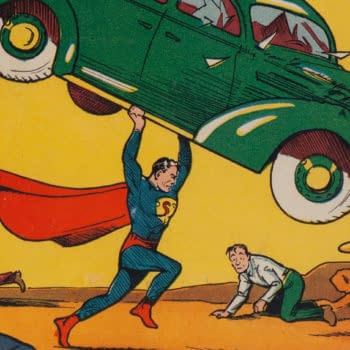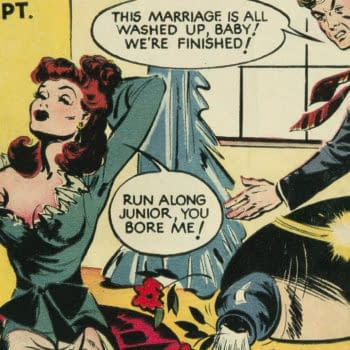Posted in: Recent Updates | Tagged: cbldf, Comics
US Supreme Court Rules Violent Video Game Law Unconstitutional In Brown v. EMA Decision [UPDATE]
![comicstrial US Supreme Court Rules Violent Video Game Law Unconstitutional In Brown v. EMA Decision [UPDATE]](https://mlpnk72yciwc.i.optimole.com/cqhiHLc.IIZS~2ef73/w:300/h:300/q:75/https://bleedingcool.com/wp-content/uploads//2011/01/comicstrial.jpg)
Complete text of the decision here.
As the CBLDF has pointed out, failed efforts to convince the US Senate to restrict content in comic books in the 1950s were cited in the decision:
Many in the late 1940's and early 1950's blamed comic books for fostering a "preoccupation with violence and horror" among the young, leading to a rising juvenile crime rate. See Note, Regulation of Comic Books, 68 Harv. L. Rev. 489, 490 (1955). But efforts to convince Congress to restrict comic books failed. Brief for Comic Book Legal Defense Fund as Amicus Curiae 11–15.5 And, of course, after comic books came television and music lyrics.
While the Senate Subcommittee hearings of 1954 ultimately declined to impose regulations on the industry, the surrounding climate did prompt the industry to create the Comics Code.
The CBLDF had issued a friend-of-the-court brief on the case:
Comic Book Legal Defense Fund today filed a friend-of-the-court brief in Schwarzenegger v. EMA, urging the Supreme Court to affirm the Ninth Circuit's decision that a California law banning the sale or rental of any video game containing violent content to minors, and requiring manufacturers to label such games, is unconstitutional.
The Comic Book Legal Defense Fund submits that, if allowed to stand, California's law would reverse fundamental First Amendment principles by creating a new category of unprotected speech, diminishing the First Amendment rights of minors, and reducing First Amendment protection for new media. The CBLDF argues that the law under review is the most recent example of government improperly attempting to regulate content by using junk science, and calls upon a history of moral panics against media that includes the 1950s crusades against comics that crippled the industry and harmed the art form. The CBLDF asks the Supreme Court to deny California this attempt to roll back protections guaranteed by the First Amendment, as it and other courts have correctly done in the past.
Charles Brownstein, Executive Director of CBLDF, says "The case California makes against video games is one familiar to the comic book industry, which was nearly destroyed by government attempts at regulation in the 1950s. Then, as now, moral crusaders claimed that popular new media containing depictions of violence were detrimental to our youth. Then, as now, pseudo-science was used to back such claims. Those claims weren't true in the 1950s, and they aren't true now."
Brownstein adds, "We hope that the Supreme Court denies California's attempt to diminish the First Amendment, and spares the video game industry the fate that was suffered by the comic book industry in the past. We also encourage them to deny California's claims so that comic books and other media don't suffer under a new constitutional standard that creates new categories of unprotected speech and diminishes the First Amendment rights of minors."
At issue in Schwarzenegger v. EMA is a challenge to a California video game law, enacted in 2005, that prohibited the sale or rental to minors of any video game containing certain violent content. The law — blocked by a federal judge in 2006 before it took effect — also required such manufacturers to include an "18 and older" warning label on the front of the package and provides civil penalties of up to $1,000 for violations. In 2008, CBLDF, as part of Media Coalition, filed a friend-of-the-court brief with the Ninth Circuit Court of Appeals in support of the respondent in today's case, arguing that speech with violent content could not be regulated by the government and that the labeling requirement was unconstitutional as compelled speech. Last year, a three-judge panel of the Ninth Circuit ruled unanimously that the law violates the First Amendment.









